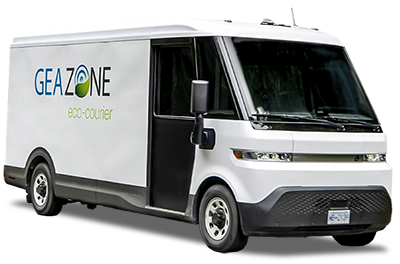Ride on: business cycle takes on new meaning

This article was written by Mike Devlin and appeared in the Victoria Times Colonist.
As a professional mountain biker, Andrew Mitchell earned four Canadian titles and numerous sponsorships.
That career ended at its prime, when Mitchell was just 23. A series of concussions robbed him of what could have been a lengthy — and lucrative — run as a rider, but concussions couldn’t kill his love of the sport.
He quickly cobbled together an exit strategy which began with a business-administration certificate from the University of Victoria. By pairing that with his interest in cycling, Mitchell came up with a revolutionary twist on the delivery business: GeaZone Eco-Courier, his zero-emission courier company.
Years of touring on the professional mountain-bike circuit gave the 26-year-old president and CEO (he calls himself an “ecopreneur”) a unique perspective on life, if not business. In Italy, for example, he would often see bikes carrying cargo through the downtowns of various cities.
That got him to thinking. “The whole focus of the business revolves around sustainability. Travelling the world, I got to see a lot of things, in terms of how things move around and how we can do it better.”
GeaZone officially got underway in 2012. In the years since, its customer base has grown considerably. The early days were spent managing a steep learning curve. GeaZone operated with just two cargo tricycles and serviced a delivery radius that went as far out of the downtown core as Gordon Head and Langford.
GeaZone is now doing daily runs to Sidney and Langford, and has routes stretching as far north as Nanaimo. In order to expand, Mitchell purchased a Nissan Leaf electric car, which kept GeaZone’s business model and ethical mindset intact.
GeaZone has since purchased two more electric vehicles for routes of greater distance, which complement his fleet of two cargo tricycles (powered by electric motors) and one traditional bicycle.
“That fits right in with who we are as a company,” says Sean Hoyne, brewmaster and owner of Victoria’s Hoyne Brewing Company. Since the summer of 2012, shortly after the brewery opened, GeaZone has delivered cases of Hoyne’s beer by bike to liquor stores in the downtown core.
“Rain or shine they show up,” Hoyne says. “They have rain gear in the winter, and pedal away. We’re thrilled to be using them.”
Bike couriers have existed for decades in the city, so GeaZone is not breaking new ground in that regard. But Mitchell manages to keep his prices on par with or in the neighbourhood of his competition because GeaZone’s delivery methods do not use costly fuel.
“We have allowed ourselves to be cost-competitive with other courier companies because of our developments in terms of technology.”
Things are coming into form for the six-employee company in other ways as well. GeaZone recently developed through its in-house IT developer, Jeff Austin, a smartphone app that enables its couriers to paperlessly process transactions. Traditional waybills are inefficient and environmentally unfriendly, Mitchell says. Processing via their app saves GeaZone 25 cents per signature while reducing their environmental impact to boot.
That alone is not good enough for Mitchell. “We want to be a completely emissions-free courier service,” he says.
“Although there is some emissions created from the electricity [that charges the cars], we want to create a sustainable infrastructure, be it solar or hydroelectric, which is fairly clean and renewable at this point.”
GeaZone was given the opportunity to expand into Vancouver, which would have meant purchasing a gasoline-powered vehicle. Mitchell declined, even though the contract would have doubled the company’s revenue within a year.
He stays competitive because the vehicles use no fuel. Forgoing that philosophy for profits is not in the cards at GeaZone, he says. “If anything, we want to give back to the grid.”
A number of GeaZone clients were early adopters, local bakeries and breweries among them. Mitchell is happy to pay it forward by giving other locally run businesses his patronage. That is the best way to ensure that the local business community takes care of its own, Mitchell says.




